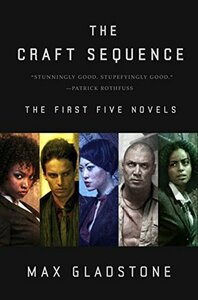Take a photo of a barcode or cover
It ain't you, Gladstone, it's me.
This had been sitting on the Kindle shelf a few years, an impulse buy after thoroughly enjoying Empress of Forever back in 2020. The pitch was irresistible: a world where magic was so infused into daily life, mages had become the equivalent of bureaucrats, lawyers, and city planners. Five stand-alone novels? Give 'em to me!
In those four years, I expanded my horizons somewhat, and it was about a fifth of the way through the first one, Three Parts Dead, that I kind of understood the vibe: a YA Perdido Street Station. Okay, cool!
By the time I got to the final book of the collection, Four Roads Cross (a direct sequel to the first book's storyline in the city of Alt Coulumb), I was saying "It's YA Perdido Street Station... shit."
Two of the five novels (the Dresediel Lex storyline, comprising of "Two Serpents Rise" and its sequel "Last First Snow") weren't as successful for me, which seems to be the general tenor among the fandom, while a third ("Full Fathom Five") was a stand-alone in a different setting, requiring some time to get into it.
By the time I got back around to the Alt Coulomb storyline, my interest (and the grace I had been extending its modern authorial voice) was running on fumes, to the point where it was almost a mercy to be done with it.
It sounds like I absolutely hated it, and I want to state that I didn't: it's a pacey, snappy read, and the setting is very creative.
Put it like this: when I watch Reacher, I feel like I'm watching a Conan show in spirit, smuggled into a package that will reach a modern general audience. Reading the Craft sequence, I feel like I'm watching a CBS sexy doctors/lawyers/prosecutors show that happens to have magic and creatures in it. Ain't nothing wrong with that, just that I wasn't fully prepared, and I probably would have had a better time if I'd just read the first book.
Ohh, here's actually another one that's perhaps more apt/damning (depending on where you stand): do you want an un-problematic HP replacement for a slightly older audience? I think this series is probably a good bet!
This had been sitting on the Kindle shelf a few years, an impulse buy after thoroughly enjoying Empress of Forever back in 2020. The pitch was irresistible: a world where magic was so infused into daily life, mages had become the equivalent of bureaucrats, lawyers, and city planners. Five stand-alone novels? Give 'em to me!
In those four years, I expanded my horizons somewhat, and it was about a fifth of the way through the first one, Three Parts Dead, that I kind of understood the vibe: a YA Perdido Street Station. Okay, cool!
By the time I got to the final book of the collection, Four Roads Cross (a direct sequel to the first book's storyline in the city of Alt Coulumb), I was saying "It's YA Perdido Street Station... shit."
Two of the five novels (the Dresediel Lex storyline, comprising of "Two Serpents Rise" and its sequel "Last First Snow") weren't as successful for me, which seems to be the general tenor among the fandom, while a third ("Full Fathom Five") was a stand-alone in a different setting, requiring some time to get into it.
By the time I got back around to the Alt Coulomb storyline, my interest (and the grace I had been extending its modern authorial voice) was running on fumes, to the point where it was almost a mercy to be done with it.
It sounds like I absolutely hated it, and I want to state that I didn't: it's a pacey, snappy read, and the setting is very creative.
Put it like this: when I watch Reacher, I feel like I'm watching a Conan show in spirit, smuggled into a package that will reach a modern general audience. Reading the Craft sequence, I feel like I'm watching a CBS sexy doctors/lawyers/prosecutors show that happens to have magic and creatures in it. Ain't nothing wrong with that, just that I wasn't fully prepared, and I probably would have had a better time if I'd just read the first book.
Ohh, here's actually another one that's perhaps more apt/damning (depending on where you stand): do you want an un-problematic HP replacement for a slightly older audience? I think this series is probably a good bet!
I have no idea why I found this a lot less engaging than my friends said. And that still frustrates me!
After I read Gladstone's newest novel (Dead Country), I decided to go back and read the rest of the Craft sequence (had already read Three Parts Dead) so that I could be caught up in time for the ARC of the next book to come out. And, luckily for me, five of the six are in this omnibus! I'm honestly surprised at the sheer range of how Gladstone chooses to move from setting to setting in this world, and seeing characters from other books in the series pop up in ones down the line with different capacities, and how they end up interacting with the main plot. Hell, Tara doesn't even show back up until book 5, or start to deal with a bunch of the immediate fallout from Three Parts Dead till then. Gladstone's writing continues to be gorgeous as hell. Onto Ruin of Angels now, which looks to be an entirely new setting but featuring Kai (whose book was one of my favorites within this collection).
inventive and solid world-building, excellent characterization. I particularly enjoyed the vampire addicts, a plausible and piercing note of horror. Highly recommended.
It's a bit sad how much I love books where people go to work in offices and deal with beauracracy despite magic and dragons and necromancy! Some great worldbuilding explored through connecting stories.
I've said a lot about these books in other places. I highly recommend this series.
Edited on 7th November to remove dates and add:
While there are many places on Goodreads that I've spoken about these books, there's one place off Goodreads I wanted to link - I wrote a review of sorts on /r/Fantasy recommending the Craft sequence to fans of Brandon Sanderson and Robert Jordan. I'm reproducing it below.
---------------------------------------------------------------
I just finished a re-read of the series because of the nomination for the Hugo Award for Best Series, and because the new book is coming out in September, and even though I thought it might not hold up to re-reading, I cannot stop raving about it.
Gladstone has everything that a Sanderson or Jordan fan wants - deft world-building that he subtly interlaces into every aspect of the book, from characterization, to language, to plot; a rule-based magic system with enough detail that the resolution of the plots of several books (most particularly the first one, Three Parts Dead) hinges on the readers understanding of the magic; and tight plotting and excellent pacing (I speak more of Sanderson than Jordan here :P ), which usually starts at a slow-burn building the characters up, until it reaches a tipping point after which you really cannot stop reading. He also has, from his very first book, several things that Sanderson lacked in his early books, - for example, Gladstone's characters are amazingly well-rounded, and seem much more real and relatable than Sanderson's early characters (like Sarene or Raoden).
Here's a short list of reasons why I recommended at least checking the first book out:
1. The first five books of his series (which form a complete sequence) are all out [and, are in fact available for $4 on Amazon as an omnibus].
2. His first three books are written as standalones (a la Terry Pratchett) - you could pick any of them up as a starting point. Book 4 is a prequel to Book 2, but it can be read as a standalone as well; Book 5 is really the only one that requires you to have read at least Books 1, 2 and 3 to fully grasp everything that happens. However, since not all of them are as detailed about their explanations about the magic system, I recommend reading 3PD first.
3. Like Sanderson (who plotted out the entire Cosmere sequence, which used to be much less well-known as a single unit until The Way of Kings came out), Gladstone has big plans for his series, even while he endeavors to keep his books modular so that they may individually be enjoyed. The wacky chronology is a good example - each of the first five books has a number in the name which represents their actual position in the internal chronology of the world - their published out of order, giving a lot of room for interesting callbacks and references that are very subtle, and enhance the enjoyment of re-reading the series (such a style is very reminiscent of Sanderson, and even Robert Jordan). This is speculative, but Gladstone has also indicated (in a "I'm joking/no I'm not" manner) that he's planning to eventually take the Craft sequence to space in some way (there's definitely parts of the book that outright state that), quite similar at least in idea to how Sanderson is planning to make the Mistborn world evolve.
4. Gladstone's world-building is immensely grounded in reality in two ways - the first is that the nations in his books are based on real world myths and cultures, very like Jordan's. When you read about Dresediel Lex, it's obvious that it's a juxtaposition of Mesoamerican culture on the Los Angeles metropolitan area, when you explore Kavekana'ai, it's evident that it's a weird melding of Hawaii and the Polynesian cultures with a Swiss tax haven, and so on. On the other, and much more obvious hand, Gladstone's world is based on the real world (for good reason - he says a major inspiration for his books was the 2008 economic crisis) and it shows, both in the world-building, the characters and the magic. To give an example of what I mean, the main characters of the first three books, are respectively a black woman who is an associate at a law firm, a hispanic man who is a mid-level risk manager at a water utilities firm, and a trans-woman who is a hedge fund employee - and he makes all these roles fit with, and in fact, be central to his magical world!
5. The exploration of faith and godhood is a central theme in all of the books in the Craft sequence - he deals with it in a very different manner than Sanderson himself, Gladstone's books are much more scientific in their treatment, more like an application of comparitive mythology to fantasy than Sanderson's style, but the presentation of faith seems fairly nuanced and accurate to me (though you might want to take this with a pinch of salt, since I'm not a believer myself). However, for a myth geek like myself, perhaps the best comparison I can make is that these books are to Tolkien what modern studies in mythology are to classical myth - as many characters in these books believe as are largely indifferent to outright antagonistic towards the gods, and it makes for a very different kind of mythopeia than classical fantasy.
-----------------------------------------------------------------
There you have it! I hope this review convinces you to read the books!
Edited on 7th November to remove dates and add:
While there are many places on Goodreads that I've spoken about these books, there's one place off Goodreads I wanted to link - I wrote a review of sorts on /r/Fantasy recommending the Craft sequence to fans of Brandon Sanderson and Robert Jordan. I'm reproducing it below.
---------------------------------------------------------------
I just finished a re-read of the series because of the nomination for the Hugo Award for Best Series, and because the new book is coming out in September, and even though I thought it might not hold up to re-reading, I cannot stop raving about it.
Gladstone has everything that a Sanderson or Jordan fan wants - deft world-building that he subtly interlaces into every aspect of the book, from characterization, to language, to plot; a rule-based magic system with enough detail that the resolution of the plots of several books (most particularly the first one, Three Parts Dead) hinges on the readers understanding of the magic; and tight plotting and excellent pacing (I speak more of Sanderson than Jordan here :P ), which usually starts at a slow-burn building the characters up, until it reaches a tipping point after which you really cannot stop reading. He also has, from his very first book, several things that Sanderson lacked in his early books, - for example, Gladstone's characters are amazingly well-rounded, and seem much more real and relatable than Sanderson's early characters (like Sarene or Raoden).
Here's a short list of reasons why I recommended at least checking the first book out:
1. The first five books of his series (which form a complete sequence) are all out [and, are in fact available for $4 on Amazon as an omnibus].
2. His first three books are written as standalones (a la Terry Pratchett) - you could pick any of them up as a starting point. Book 4 is a prequel to Book 2, but it can be read as a standalone as well; Book 5 is really the only one that requires you to have read at least Books 1, 2 and 3 to fully grasp everything that happens. However, since not all of them are as detailed about their explanations about the magic system, I recommend reading 3PD first.
3. Like Sanderson (who plotted out the entire Cosmere sequence, which used to be much less well-known as a single unit until The Way of Kings came out), Gladstone has big plans for his series, even while he endeavors to keep his books modular so that they may individually be enjoyed. The wacky chronology is a good example - each of the first five books has a number in the name which represents their actual position in the internal chronology of the world - their published out of order, giving a lot of room for interesting callbacks and references that are very subtle, and enhance the enjoyment of re-reading the series (such a style is very reminiscent of Sanderson, and even Robert Jordan). This is speculative, but Gladstone has also indicated (in a "I'm joking/no I'm not" manner) that he's planning to eventually take the Craft sequence to space in some way (there's definitely parts of the book that outright state that), quite similar at least in idea to how Sanderson is planning to make the Mistborn world evolve.
4. Gladstone's world-building is immensely grounded in reality in two ways - the first is that the nations in his books are based on real world myths and cultures, very like Jordan's. When you read about Dresediel Lex, it's obvious that it's a juxtaposition of Mesoamerican culture on the Los Angeles metropolitan area, when you explore Kavekana'ai, it's evident that it's a weird melding of Hawaii and the Polynesian cultures with a Swiss tax haven, and so on. On the other, and much more obvious hand, Gladstone's world is based on the real world (for good reason - he says a major inspiration for his books was the 2008 economic crisis) and it shows, both in the world-building, the characters and the magic. To give an example of what I mean, the main characters of the first three books, are respectively a black woman who is an associate at a law firm, a hispanic man who is a mid-level risk manager at a water utilities firm, and a trans-woman who is a hedge fund employee - and he makes all these roles fit with, and in fact, be central to his magical world!
5. The exploration of faith and godhood is a central theme in all of the books in the Craft sequence - he deals with it in a very different manner than Sanderson himself, Gladstone's books are much more scientific in their treatment, more like an application of comparitive mythology to fantasy than Sanderson's style, but the presentation of faith seems fairly nuanced and accurate to me (though you might want to take this with a pinch of salt, since I'm not a believer myself). However, for a myth geek like myself, perhaps the best comparison I can make is that these books are to Tolkien what modern studies in mythology are to classical myth - as many characters in these books believe as are largely indifferent to outright antagonistic towards the gods, and it makes for a very different kind of mythopeia than classical fantasy.
-----------------------------------------------------------------
There you have it! I hope this review convinces you to read the books!
Maybe I shouldn’t have committed to reading all five of these books back to back. It took me two months, and I have forgotten what the hell else I was meant to be doing with my bookish life. But, on the other hand? This world deserves total immersion.
Would I recommend undertaking this marathon readthrough? Depends how you like to experience your sprawling SFF series. Reading all five in sequence, you catch every cross-reference, picking up more easily on the shape of the loose arc these books describe, and understanding perhaps the shape of things to come.
Individually, each book in the Craft Sequence is a funky little dip into Gladstone’s fascinating world. As a series, these books are a masterpiece. Each book is a different view on Gladstone’s orrery, and characters and events revolve into and out of view through each one. It’s only through the series as a whole you begin to understand the universe, its actors and its currents. It’s through these trans-instalment events that Gladstone evokes the power of the structures of the world, capitalism and commerce and bureaucracy in motion as powerful as gravity, as magic (which it in fact is).
I don’t know if I recommend reading all five books in a row, but if you’re thinking of reading one? Read all of them.
Would I recommend undertaking this marathon readthrough? Depends how you like to experience your sprawling SFF series. Reading all five in sequence, you catch every cross-reference, picking up more easily on the shape of the loose arc these books describe, and understanding perhaps the shape of things to come.
Individually, each book in the Craft Sequence is a funky little dip into Gladstone’s fascinating world. As a series, these books are a masterpiece. Each book is a different view on Gladstone’s orrery, and characters and events revolve into and out of view through each one. It’s only through the series as a whole you begin to understand the universe, its actors and its currents. It’s through these trans-instalment events that Gladstone evokes the power of the structures of the world, capitalism and commerce and bureaucracy in motion as powerful as gravity, as magic (which it in fact is).
I don’t know if I recommend reading all five books in a row, but if you’re thinking of reading one? Read all of them.





